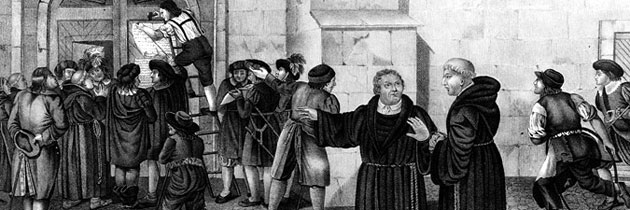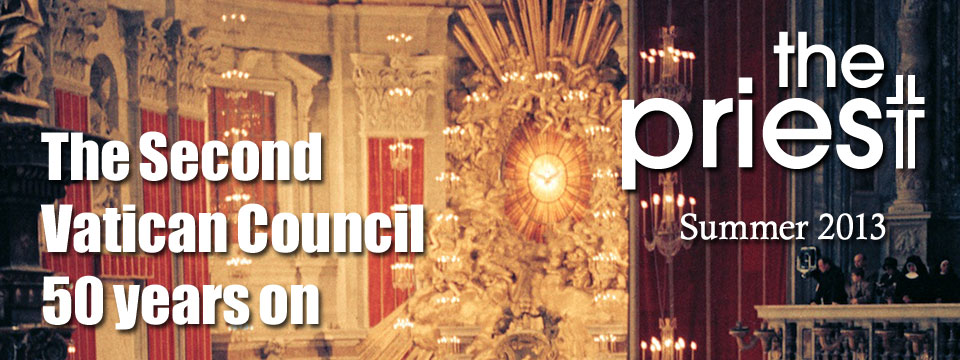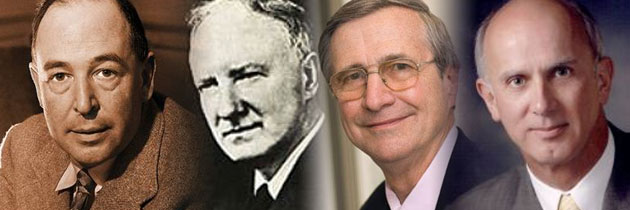- What grace is
- The teaching of the Council of Trent: Decree on Justification
- The Protestant errors regarding grace and justification
- The controversies between the Jesuits and Dominicans in the 16th century and beyond
- A passage by Matthias Scheeben on grace
These articles derive from a paper Fr Peter Joseph tabled at the 2012 ACCC Conference, Grace and Justification: Trent and later controversies.
Now I don’t mind saying, as part of ecumenical exchange, that Luther (1483-1546) was a maniac, and Calvin (1509-64) was a raving maniac. Luther had been a priest and Augustinian monk; Calvin was reared a Catholic, but was never ordained or took vows. The two men never met.
Justification by faith alone
Luther taught, as everyone knows, justification by faith alone. No other disposition, such as hope or charity (contrition?) is needed. Apart from the error of “faith alone,” there are three other differences from us within that proposition “justification by faith alone”:
- By “faith” he meant not really the theological virtue of faith as we define it, but a fiducial faith, a trust that for the sake of Christ’s merits God will not punish us as we deserve.
- Further, he also meant by “justification,” permanent and irreversible justification; in other words, once justified you are saved; you can never lose that state of justification, no matter what you do. Evangelicals and other Fundamentalists today hold the same. Some say that apostasy alone can destroy it; others, when pushed, say that later abominable sins show that one did not really have faith to begin with.
- In contrast to the idea that grace and justification are interior realities, Luther and Calvin held grace is a merely extrinsic imputation by God of the grace merited by Christ. In other words, there is no interior renewal but you are treated differently by God, though you have not changed. That is the basis for Luther’s saying, “Simul iustus et peccator” – “Righteous and sinful at the same time.” In this system, justification does not demand an infusion of habitual grace or the theological virtues.
Further, for Luther the justice conferred is equal for all; it cannot increase through good works.
We need to know how to reconcile the texts of St Paul who said such things as “For no human being will be justified in God’s sight by works of the law” (Rom 3:20); with Rom 2:6: “For He will render to every man according to his works”. In the first quote, St Paul is talking about the Old Law. So the quote provides no difficulty. Luther was applying it to the New Law—a complete misinterpretation.
When researching the life of St Edmund Campion, I discovered a book published in 1999, the full text of the transcripts of his four debates in the Tower of London with the Protestant theologians. Those transcripts were taken down privately by Catholics present. One exchange was very enlightening for me. For I never knew how to reconcile the texts of St Paul who said such things as, “we hold that a man is justified by faith apart from works of law” (Rom 3:28) and Rom 5:1: “since we are justified by faith, we have peace with God”—with such texts as Rom 2:6: “For He will render to every man according to his works”. The way to reconcile them is to make a distinction between the works before faith, and the works after faith; between the initial justification (all a work of grace) – and the life of grace lived thereafter, where you are held to account for the gift of grace entrusted to you, where you must invest your gift and make a return. Before faith, your works have no supernatural value; after faith your works are crucial and have value.
Campion on works before faith and after faith
Charke. If there be anything specially laboured and therewithal plain and evident in all the Scriptures, it is this profession: sola fides justificat [faith alone justifies]. And here I protest in the Lord that in the behalf of this audience to whom, as Campion lately said but feignedly to the doctors, I am ready in the Lord God to do all the service I may. I will allege 11 places out of the Scripture which do manifestly prove it to be the plain and true sense of God’s Word that faith only doth justify.
Campion. This position, that faith only doth justify, is not in all the Word of God.
Charke. There are eleven places negative that works do not justify. [Which he then enumerated.]{{16}}
Campion. Of all your places there is none that doth probably [probatively] prove your position. And because you do generally vouch them, I will answer them generally. The cause why St Paul urges faith so much was because he was troubled with two kind of people, the Jews and the Gentiles. The Jews thought they might not be justified without the performance of the ceremonies of the Old Law, and the performance thereof was the cause of their election. And likewise the Gentiles attributed so much to the moralities [the natural moral law], thinking them to be the cause of their election, to avoid which errors was the scope of that epistle to the Romans, and to exclude works going before faith, and not to exclude works done in grace after faith. And this is my answer generally to those places alleged, reserving their several answers to every place incidently as they are alleged. (Edmund Campion, 2010 ed., p. 423)
Predestination
What undoubtedly prompted Luther to invent his novel doctrines regarding salvation and how to achieve it was his obsession over whether he was saved or would be saved. He wanted to know whether he was among the predestined. Usually it’s better to avoid that word “pre-destined” even though it is Biblical and is in St Paul. Recently, I read a short book by Swiss theologian Fr Charles Journet, talks by him given in 1956, The Meaning of Grace. The book is a little masterpiece – most of it is in simple and colloquial terms, but backed by a lot of learning. He treats of predestination concisely and ably.{{17}}
In short, if anyone is not among the predestined, it is in consequence of a refusal for which he bears and always will bear the responsibility. I remember Father Peter Little S.J. saying, “Everyone is predestined—predestined to Heaven. All are predestined to heaven—but that plan of God can be thwarted by human sin and refusal.” We reconcile God’s will or plan with the outcome by speaking of God’s antecedent will and consequent will. As a teacher, I want all my students to pass and even excel—but when I mark them after the exams, I can pass some and fail others.
As the Catechism of the Catholic Church says, at par. 1037: “God predestines no one to go to Hell; for this a wilful turning away from God (a mortal sin) is necessary, and persistence in it until the end.” Par. 600 says: “To God, all moments of time are present in their immediacy. When therefore He establishes His eternal plan of ‘predestination’, He includes in it each person’s free response to His grace”.
Calvin on predestination
Calvin’s doctrine in his Institutes of the Christian Religion is that, just as some are predestined to Heaven, so are others to Hell. God Himself therefore leads them to Hell, and they cannot escape it. This is the thesis of double predestination: one to Heaven, which is just—but even in that they understood it wrongly; for Luther and Calvin, the good act comes solely from God, and not from God through man. So there is a two-fold error here: predestination to Heaven is misconceived, and the idea of predestination to Hell is introduced—a still worse aberration. Generally, Protestants today no longer defend Calvin on this point; Swiss Calvinist theologian Karl Barth (pronounced ‘Bart’) (1886-1968) declared frankly that he cannot find this idea of predestination to Hell anywhere in St Paul. Moslems also believe in double predestination: some are fated by Allah for Heaven; others are fated by Allah for Hell.
As we know, some Catholics are deeply troubled by the problem of predestination. A man may ask himself: “Am I saved? If I am predestined whatever I do, I am sure of salvation; and if I am not predestined, whatever good I do is no use at all.”
The (15th century) Imitation of Christ, Book 1, chapter 25, mentions a case briefly:
A certain man being in anxiety of mind, continually tossed about between hope and fear, and being one day overwhelmed with grief, cast himself down in prayer before the altar in a church, and meditated within himself, saying, “Oh! if I but knew that I should persevere,” and presently heard within him a voice from God, “And if you did know it, what would you do? Do now what you would do then, and you shall be very secure.” And straightaway being comforted and strengthened, he committed himself to the will of God and the perturbation of spirit ceased, neither had he a mind any more to search curiously to know what should befall him hereafter, but studied rather to inquire what was the good and acceptable will of God, for the beginning and perfecting of every good work.
For the question of predestination, the saints managed to find answers that resolved it, not theoretically, but concretely. The devil tried to trouble Saint Teresa with the thought that all was fore-ordained: “Why give yourself all this trouble?”, he asked her, “The die is cast!” In her spirited way, she replied: “Then it was not worthwhile for you to take the trouble to come and tell me!”
Catholic-Lutheran reconciliation?
In 1999 was issued a Lutheran-Catholic Common Declaration on Justification (Cardinal Ratzinger said at the time that it has no authority). Of course, to clear up the differences definitively or to establish them clearly, all we should do is to ask Lutherans to go through Trent’s decree line by line, and say what they can accept, and what they cannot accept, and why not: what reason they have exactly. Or likewise, go through the 33 canons, and say which they can accept and which they cannot, and why not exactly (Biblical arguments, or emphasis, or their own doctrines).
In the year 2000, leaders of the Catholic and Lutheran churches in Sydney signed a small one-page Joint Declaration on Justification.
A press release said:
A central dispute during the Protestant Reformation was whether believers were justified and saved by grace alone or whether salvation required a combination of grace and good works.
Now that press release combines and confuses two things: being justified and being saved. We are justified at the start by grace alone (prior works have no role) — but we are saved if we continue in a state of justification by also producing good works.
Now that Joint Declaration on Justification made by Cardinal Clancy, on behalf of the Australian Bishops, and Rev. Dr Lance Steicke, President of the Lutheran Church of Australia, was defective; it said nothing false, but it spoke only of the removal of sin while saying nothing about any positive acquisition, nothing about the new life of grace.
[[16]]Here are the 11 passages in full:
- 1. Romans 3:20: “For no human being will be justified in his sight by works of the law”.
- 2. Romans 3:21-22: “But now the righteousness of God has been manifested apart from law, … the righteousness of God through faith in Jesus Christ for all who believe”.
- 3. Romans 3:28: “For we hold that a man is justified by faith apart from works of law.”
- 4. Romans 4:6: “David pronounces a blessing upon the man to whom God reckons righteousness apart from works”.
- 5. Romans 4:13: “The promise to Abraham and his descendants … did not come through the law but through the righteousness of faith.”
- 6. Romans 9:11: “though they were not yet born and had done nothing either good or bad, in order that God’s purpose of election might continue, not because of works but because of his call”.
- 7. Romans 11:6: “But if it is by grace, it is no longer on the basis of works; otherwise grace would no longer be grace.”
- 8. Galatians 2:16: “We ourselves … know that a man is not justified by works of the law but through faith in Jesus Christ, even we have believed in Christ Jesus, in order to be justified by faith in Christ, and not by works of the law, because by works of the law shall no one be justified.”
- 9. Ephesians 2:8-9: “For by grace you have been saved through faith; and this is not your own doing, it is the gift of God—not because of works, lest any man should boast.”
- 10. 2 Timothy 1:9: “who saved us and called us with a holy calling, not in virtue of our works but in virtue of his own purpose and the grace which he gave us in Christ Jesus”.
- 11. Titus 3:5-7: “he saved us, not because of deeds done by us in righteousness, but in virtue of his own mercy … through Jesus Christ our Saviour, so that we might be justified by his grace”.
[[16]]
[[17]]Some of the paragraphs following are taken from him, adapted & shortened.[[17]]






